Nepal and Finland established diplomatic relations in 1974. The bilateral relations between these two nations have been marked by cordiality, friendship, and cooperation. Finland has been assisting Nepal in several areas such as education, water and sanitation, poverty alleviation, gender equality, among others.
Nepal-Finland relations are based on mutual cooperation and a shared commitment to grow together. Ishwar Dev Khanal and Kabita Shrestha of Khabarhub talked to Pertti Anttinen, the Ambassador of Finland to Nepal on various range of issues. Excerpts:
It has been 46 years that Nepal and Finland have established a bilateral relationship. How do you see the developments?
In fact, the relationship between Nepal and Finland has had a long history as we have partnered in development since the 1980s. Finland established its Embassy in Nepal in 1992. Indeed, Nepal is one of Finland’s long-term partner countries when it comes to development. Therefore, we are committed to be helpful here, and to be together in partnership with different stakeholders, the government of Nepal, civil society, various communities, among others.
What are Finland’s priorities in Nepal?
Finland’s priority is consistent — to help Nepal. During the decade-long conflict here, we stood by Nepali people, also helping them in the peace process, contributing to the constitution-making process, among others.
Another priority is making a trade partnership with Nepal and to bring Finland’s products into the Nepali market. Frankly speaking, we are ready to do business with Nepal.
To tell you, Finland’s business community is ready to come to Nepal to have fruitful cooperation in Nepal’s growing market.
However, this has not fully materialized due to the Covid-19 pandemic. However, we are optimistic that the situation improves in the future. As we all know, travel has been difficult because of which, meetings had to be postponed.
There are several projects in the pipeline. We were planning to implement our business plan in Nepal during the Sagarmatha Sambat last April, which, unfortunately, did not happen due to the pandemic.
Hopefully, business people will visit Nepal next year. Despite all these, we’re able to make some funding to support Nepal’s efforts to stem the spread of coronavirus.
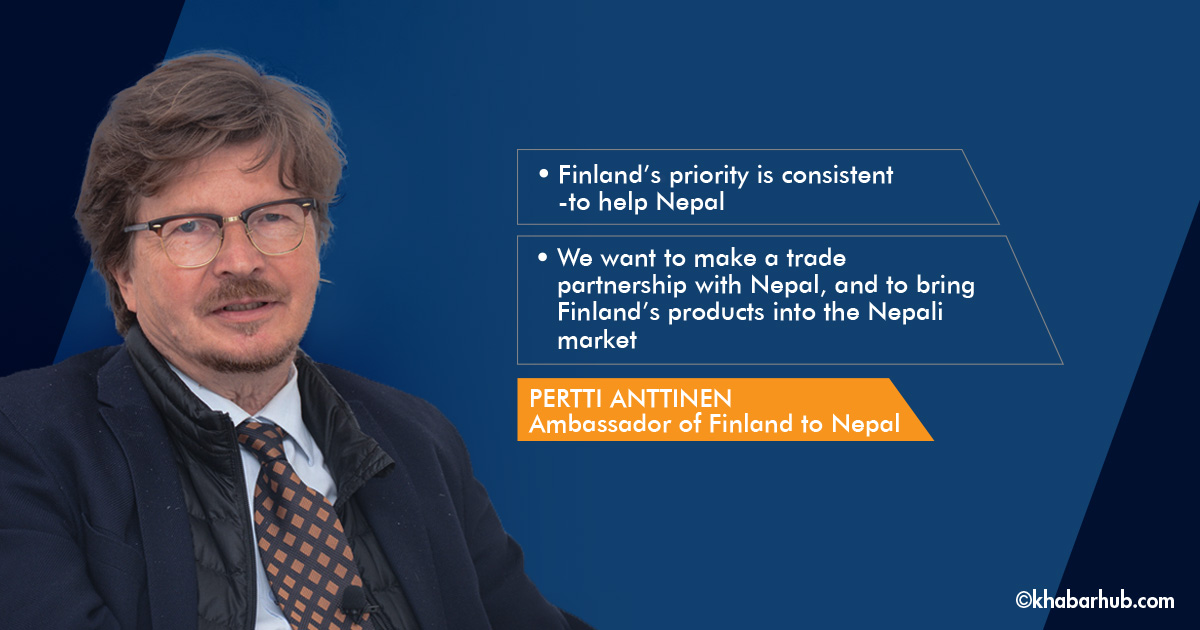
In fact, Finland’s programs in water and sanitation – a US$16 million project — have been accelerated in the Sudurpaschhim Province during this period. As many as 350,000 Nepalis have been the beneficiaries of our projects, which have been co-sponsored by the European Union.
Furthermore, we have also made an extra contribution of 2.5 million Euros in Nepal’s education sector.
A quite a few Finnish organizations are working in Nepal. How do you rate their contribution?
As I said earlier, Finnish civil society is engaged to support Nepal’s development efforts. As many as 17 Finnish NGOs are currently working in Nepal through their local partners. Finnish NGOs implement local counterparts to implementing the projects in Nepal.
I believe that these programs have been receiving quite a lot of compliments and are complementing what the government wants to do, particularly in sectors such as the social, education sector, and health.
Can we expect any new Finland’s funded program in the future?
In fact, we had a virtual meeting with Finland’s Ministry of Development and Foreign to discuss Nepal’s situation. The meeting basically emphasized Nepal for the year 2021 and the program that are in the final stage.
The last four year’s programs in Nepal have prioritized water and sanitation, livelihood and climate change, and education. Education is one of the key elements of success in Nepal. It is very important for Nepal to augment the quality of education, and to enroll the children of marginalized groups.
We would like to continue our support in the education sector. We would also like to work on gender equality, which, I believe, is important here as women, too, have an equal role in society, politics, business, public life, and all walks of life. We have experienced that women’s participation in society is important.
Could you explain a bit about FINN Partnership and its projects in Nepal?
Yes, we work on a country-to-country level basis — working through governments and other implementing agencies, as well as stakeholders.
We do have specific complementary instruments and financial instruments. FINN partnership is a kind of business-to-business cooperation instruction focusing on the private sector. Therefore, it’s not only a government-to-government engagement but also focuses on private to private enterprises.
For instance, if a Finnish company wishes to come to Nepal and to find a private company here, it can make an investment.
This is a partnership instrument that helps financial instruments to overcome some of the hurdles like market study, pilot projects and facilitate the Nepali business community.
We also have six projects that are under implementation. Here, I want to say that Nepal is a beautiful country for export-related business. Before, the Covid-19 pandemic, some tea and coffee companies have shown their interest to export their products to the Finnish market. Finland also supports Nepal to export goods to developed countries.
Finland is supporting Nepal in collaboration with the European Union? Could you elaborate more on this?
European Union, in fact, is one major player in Nepal in terms of funding. It is working with the government and the private sector.
We call it direct elite cooperation. In terms of Finland’s support, we have direct-elite cooperation in the Sudurpaschim Province, which is quite new for us. In Nepal, Finland is pioneering in EU cooperation in terms of joint funding.
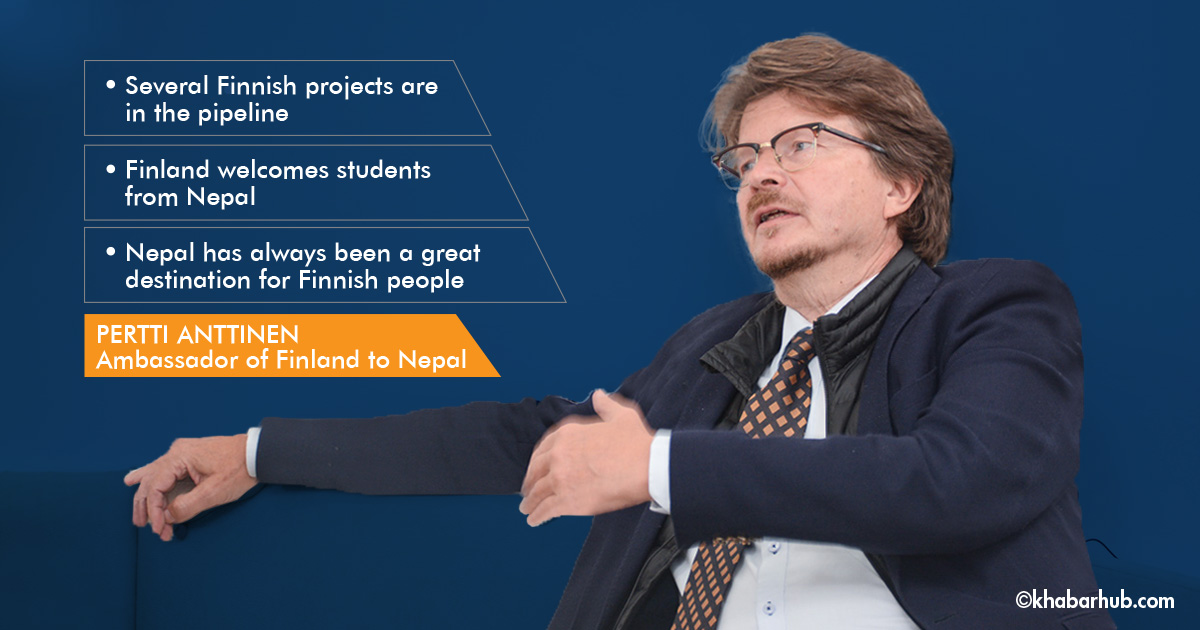
We have a good experience of cooperation. I think it is very important to work together to make big funding more effective. That’s what European Union at the policy level wants to see here. They are also talking about Team Europe Initiatives for better performance, and solving problems together.
What is your take on the development of diversity in Nepal?
It has been three years now that I have been working as an Ambassador here. I believe Nepal has made significant progress. One of the very important developments was to get out of the internal conflict. Development works are hampered wherever there is a conflict or political turmoil.
It took complete 10 years to come out of the conflict in Nepal. The international community, too, was pleased when Nepal promulgated a new constitution in 2015. That, in fact, was a great achievement for Nepal and its people. Before the Covid-19 pandemic, the economic growth rate was 6 or 7 percent, which is a good indication.
Moreover, several infrastructure developments have taken place, mainly because of the remittance. However, Nepal needs more business, more sustainable investment. Moreover, the investment environment has to be supportive and conducive.
Since this is a competitive world, nobody will give you free. You have to build an environment that is conducive ranging from addressing the regulatory pressures, rules to make a business grow, business flow, and export more. These are very crucial elements. Nepal needs to work towards exporting its products to the European market since it is quota-free and duty-free.
How do you see that people-to-people relation between the two countries?
Frankly, there is an outstanding people-to-people relationship between Finland and Nepal. We have a quite long relationship. Over the years, people in Finland have started to know and understand Nepal. Moreover, Nepal has a positive image in Finland.
The number of Nepali students in Finland has been increasing each year. Moreover, Finland has been very generous to offer scholarships to not only Nepali students but to everybody. However, there may be a negligible fee structure soon.
Studying in Finland is not expensive. Finland welcomes students from Nepal. Meanwhile, Nepal has always been a great destination for Finnish people to come and Nepalis returning from Finland can help boost business relations, and other potential areas.
How do you analyze Nepal’s ongoing political situation?
Nepal currently has no House of Representatives. Talks about general elections are going on. The Supreme Court is giving its verdict on the issue. And, we, mostly the international community, are waiting for this. Can’t say what happens.
It’s important that Nepal moved ahead by resolving all disputes through peaceful means. Peaceful meetings and rallies, and peaceful procedures are needed by discarding all forms of violence by any party, or any faction.


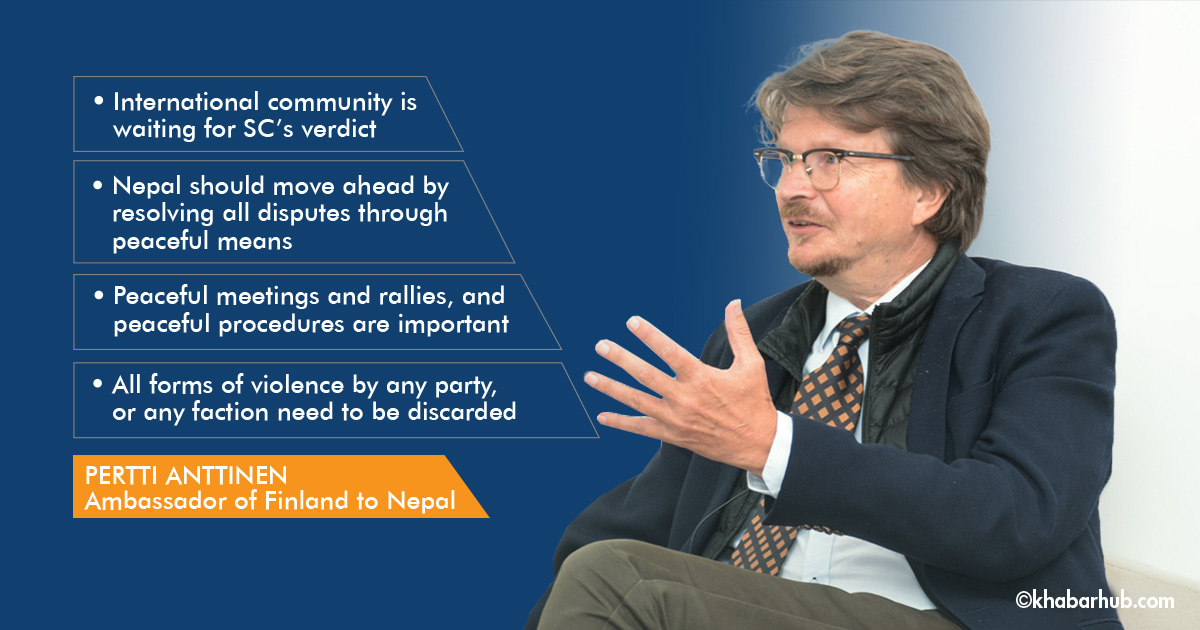
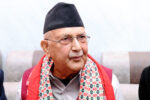

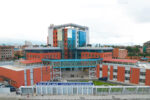



Comment